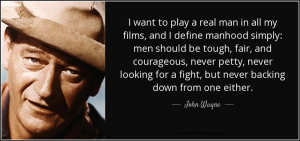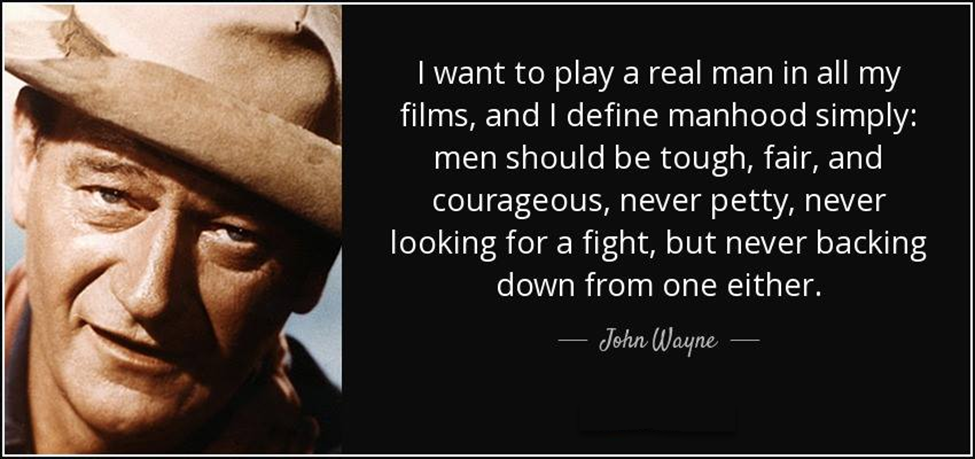The War Against Real Men
The War Against Real Men
 I’ve written before about a confrontation I was involved in when I was in high school. It happened during the second semester of my senior year. At that time, my class schedule was arranged in such a way that every afternoon I passed one of my cousins in the hallway at the same time. I was two years older than my cousin.
I’ve written before about a confrontation I was involved in when I was in high school. It happened during the second semester of my senior year. At that time, my class schedule was arranged in such a way that every afternoon I passed one of my cousins in the hallway at the same time. I was two years older than my cousin.
On one particular day when I passed him in the hallway, he had a look of fear on his face and was moving at a fast pace. When I turned around to see what was going on, I noticed that there was a bully chasing him. I was familiar with the bully because he was the younger brother of a boy who had bullied me when I was in eighth grade.
I immediately chased after my cousin and the bully. By the time I caught up with them, the bully had knocked my cousin’s books out of his hand. The books were scattered all over the floor. While my cousin was on his knees attempting to pick up his books, the bully was standing over him taunting him and telling him that he was going to kick his a**.
I calmly helped my cousin pick up his books. As I handed the last book to my cousin, the bully was still taunting him. I bolted toward the bully and knocked him down. As he was getting up, I shouted at him: “If you want to fight him, you’re going to have to go through me first! We can take care of this now or after school. Which one do you want — now or later?”
The bully stood up and raised both of his hands in front of him with his palms facing toward me and said, “Hey man, this isn’t between you and me. You don’t have anything to do with this. It’s between me and him. I don’t want to fight you.” I told the bully that he was going to have to fight me first, but he repeated, “I don’t want to fight you. This isn’t between me and you.”
I then got in his face and shouted, “If you ever lay a hand on him, I will hunt you down and beat you into the ground! Do you understand? You’re not to ever touch him or talk to him again. Do you understand me?” At that point, the bully stepped back and looked around at the crowd of students that had formed a circle around us. In a defiant tone of voice, he shouted, “Yea, I understand!” Then he turned around, pushed his way through the students, and disappeared into the crowd.
I walked my cousin to his next class and told him that if the bully ever talked to him or bothered him again to let me know. He thanked me for sticking up for him and walked into the classroom. For the next few weeks, I asked my cousin every day if the bully said anything to him or bothered him. The answer was always “No.”
I took a risk that day when I confronted the bully. I knew that there was a school policy in place that anyone who got into a fight on school grounds was automatically suspended for three days, regardless of the reason for the fight. It was a policy that was enforced and I knew that if I ended up getting into a fight, I was going to be suspended.
But I wasn’t worried about it because while I was growing up, my dad had made it clear to me and my eight brothers that if anyone ever bullied or laid a hand on any of our sisters or family members, he expected us to step in and take care of the person who was causing the trouble. I knew that if I stuck up for my cousin, my dad would not have any problem with me being suspended. In fact, he would be proud of me for taking the matter into my own hands.
I thought about that high school incident last week when I heard about the marketing video that the razor blade company, Gillette, had released. In the video, there were numerous men who were depicted as jerks and bullies. What was shown in the video was the exact opposite of what had been shown in a commercial that Gillette released in 1989. That commercial showed fathers hugging their sons, a dad cuddling his newborn child, men proudly working at their jobs, athletes competing at events, a man and a woman on their wedding day, and a young man running toward the woman he loved, and then embracing her.
It was a great commercial that ended with the tagline “The Best a Man Can Get.” The commercial showed the heroic qualities that men who have the right values, motivations, and ambitions can achieve. It was an extremely positive commercial that lifted the viewers’ spirits.
The video that was released by Gillette last week was the exact opposite of the 1989 commercial. At the beginning of the video, the voices in the background commented on bullying, violence, toxic masculinity, and the #MeToo movement. Then an announcer in the background said, “Is this the best a man can get?”
The video then showed images of boys bullying each other and men harassing women. To top everything off, the video showed a long row of mean and nasty looking men who were standing in front of their outdoor grills with their arms crossed. They kept repeating, “boys will be boys, boys will be boys, boys will be boys.”
Then the video showed a few decent men intervening to save the victims from bullying. At the same time, in the background, the announcer lectured the viewers about what they needed to be doing to correct their behavior. The implication was that this type of nasty, cruel, and predatory behavior was typical of all men. The message was that, by nature, men are the worst that they can be and they need to work at being better.
You will never see an ad from Gillette or any other company that implies that all women make false sexual abuse allegations, do everything in their power to deny the fathers of their children visitation rights after a divorce, and do whatever they can to ruin the reputation of the men they were once romantically involved with. Such an ad would immediately (and rightfully) be condemned. But for some reason, men are fair game when it comes to sticking them all in the same evil category.
Over the past several months, there’s been a constant drumbeat in the media that claims that all men are not only mean and evil, but they are also sexual predators. There is a term that is being used to label these men: “toxic masculinity.”
While that term has only been around for a couple of years, over the past several months, it’s been highlighted and featured in several articles and newscasts. Here’s how the Urban Dictionary defines the term “toxic masculinity”:
Toxic Masculinity is a term that far leftists use to try to manipulate real men into feeling shameful for being themselves and feeling like normal men do. They try to associate things like rape and physical abuse to that of normal masculine behavior without any substantiation, and try to group everyone into a category rather than deal with people and their actions on an individual basis.
Over the past 40 years, the practice of categorizing certain individuals into a cleverly named all-inclusive evil category has been perfected by the mainstream media, institutions of higher education, multinational corporations, and our federal, state, and local governments. After lumping groups of individuals into an all-inclusive evil category, these organizations and governmental bodies then proceed to slander, berate, demean, and bully those groups of individuals into submission.
So why is there such a sharp focus on the evils of being a real man? I’ll answer that question next week.





2 Comments
I’m awaiting your next week’s explanation. Thank you for all of the research you do to provide us with worthwhile facts. Love to you, Georgette and your family.
Sister Roberta
[…] last week’s article, The War Against Real Men, I wrote about the marketing video that was recently released by Gillette, which implied that all […]